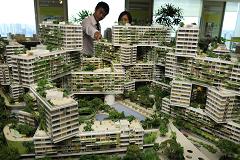
Expectations that the cheap liquidity which has helped boost Asian real estate markets will come to an end with the U.S. Federal Reserve likely to start winding down its monetary stimulus soon have hit Asian risk assets hard. The sell-off in emerging markets this week has been particularly pronounced.
| Lets play stacko like how they build The Interlace Condominium in Singapore. It should be fun if everything collapse. -- Bloomberg PHOTO | The hit from the Fed tapering fears to Singapore's property market is already underway, said Tim Gibson, head of Asian property equities at Henderson Global, which has around $107 billion worth of assets under management. "Anything that is yield-like has been sold off," he said, saying there has been a knee-jerk reaction to worries about an unwinding of the Fed's asset purchase program. He expects the shake-out period to last three to six months. |
Singapore's new private home sales dropped by around 73 percent to 481 homes in July from June's 1,806, in part due to the city-state's efforts to cool the market, according to data from Singapore's Urban Redevelopment Authority.
But in the second quarter, private home prices rose 1.0 percent from the previous quarter, remaining around record highs.
Property prices are not likely to fall too much in the months ahead, said Tata Goeyardi, a property analyst at Religare Capital. "It usually comes down because of distressed selling. But economic growth is stronger than expected. People are keeping their jobs," he noted. "Even if it comes down, there won't be a crash."
Singapore's gross domestic product (GDP) for the second quarter rose 15.5 percent from the previous quarter on an annualized basis, topping analysts' expectations for a 14 percent rise and spurring some economists to raise their full-year forecasts for economic growth.
Employment conditions in Singapore meanwhile remain relatively robust. The country's unemployment rate stood at 2.1 percent in the second quarter, up from 1.9 percent in the first quarter. Still, that compares with an unemployment rate of 3.9 percent in Japan and 7.4 percent in the U.S.
Goeyardi said it was a good time to buy into Singapore's property stocks since concerns that potential Fed tapering would turn Singapore's real interest rates positive was probably priced in a couple of months ago.
Going strong
"There's still strong demand for homes, especially in the suburbs and there's still liquidity in the market," added David Neubronner, national director for residential property at Jones Lang LaSalle Property in Singapore.
But there might be some trouble ahead, he added.
"In the short term, it [housing market] should hold up, but medium to long term, there will be pressure because of the new supply coming up," Neubronner said.
In a July research note, Daiwa estimated the pipeline of new homes in Singapore at 200,000 units for 2013-17.
Neubronner added that public housing prices were falling, which could undermine demand for condominiums.
Another property analyst, who asked not to be named, said Singapore's property market was clearly at a peak right now.
"Any negative development could trigger a sharp correction in the market. I would guess the Fed tapering could be one of those catalysts," he said.
 RSS Feed
RSS Feed